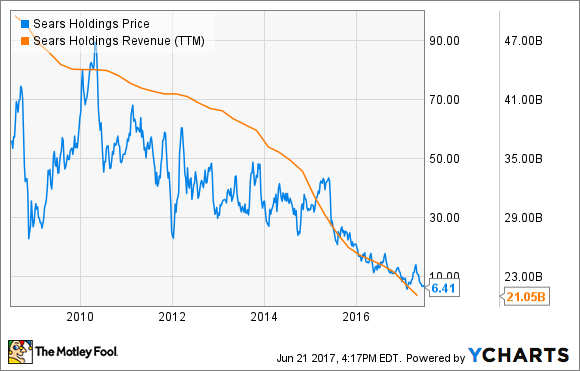There are some stocks you couldn't persuade me to buy if they were the last tickers on the market. They are headed toward extinction-level events and are hardly worth the electrons their digital stock certificates are printed on.
For me, that list includes fading retailer Sears Holdings (SHLD +0.00%), near-forgotten smartphone veteran BlackBerry (BBRY 1.02%), and regional telecom Frontier Communications (FTR +0.00%). Your list of blackball stocks may be different; read on to see why I'm staying away from these tickers.

Image source: Getty Images.
How to burn cash and alienate investors
Frontier Communications has a habit of picking up the landline and FiOS operations that Verizon Communications (VZ 1.14%) doesn't want to deal with anymore. Two large Verizon deals in 2010 and 2016 have more than quintupled Frontier's annual sales in seven years, yet they didn't help Frontier's earnings or free cash flows at all.
Furthermore, the company's debt balances rose from $4.8 billion to $17.9 billion and annual interest expenses quadrupled to $1.5 billion. Lacking the large cash flows you'd expect from a mature telecom company, Frontier is cutting its dividend to help finance the debt-servicing costs.
And management has not shown much concern for long-term shareholders, either -- the Verizon deals involved both new debt and a massive load of new Frontier shares going into the hands of Verizon's owners. Share prices have reacted as one might expect under this campaign of creative value destruction:
This is not a turnaround story just waiting to be told. It's a long, slow death march under the yoke of expensive and unprofitable wireline operations. I suppose the FiOS portion of Frontier's Verizon transactions could have worked out, since high-speed internet connections have worked wonders for other cable and telecom operators in recent years. But even there, Frontier is losing customers quarter by quarter and data service revenue keeps falling.
I don't see a happy ending to Frontier's gloomy story. Not now, not in 10 years, not until the company completely shakes up its business model to come up with something that works. Failing that, this stock is going to zero in the long run.
No more "CrackBerry" addictions
Once upon a time, BlackBerry was synonymous with "smartphones." High-quality physical keyboards made the company's devices a joy to use for secure text messaging and basic web browsing.
Then Apple and the Android gang showed up with their sleek touchscreens and massive app stores. The smartphone game changed overnight, and BlackBerry never managed to find a foothold in the new market.
This chart speaks volumes of BlackBerry's fading fortunes:
BlackBerry CEO John Chen is turning the former smartphone giant into a very different business. The Canadian company is now all about secure messaging apps and data security tools. Best of luck, but BlackBerry burned a ton of credibility years ago. Any success the company finds at this point must be built from scratch, not resurrected from the glory days.
This turnaround effort is a risky proposition, and it's easy enough to find better investments elsewhere. BlackBerry simply doesn't belong in my portfolio.
It's a long way down from Sears Tower (Oops, I mean Willis Tower)
Finally, I can't think of a single company more obviously headed to the scrap heap of history than Sears Holdings. The mall-based store chain started circling the drain long before Frontier or BlackBerry, and there's no going back:
Kmart and Sears stores are closing their doors by the hundreds, the company is selling off real estate assets and household-name product brands to stay afloat, and billionaire CEO Eddie Lampert was forced to prop the balance sheet up with cash from his own pockets, since banks are no longer interested in doing business with Sears.
I don't even have to aim my laser pointer at Sears to see it crumble. This company is falling apart on its own, and I don't want anything to do with it.











